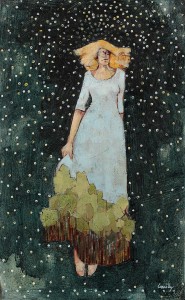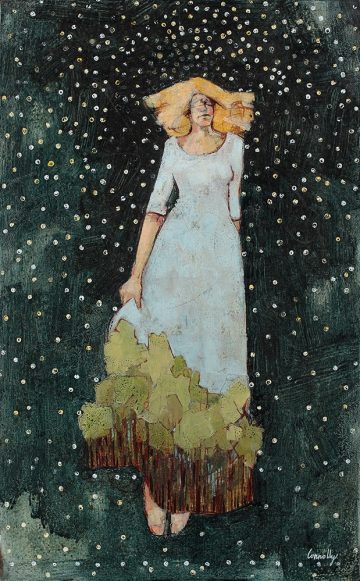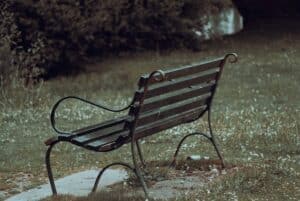
by Alicia
Read Part I here.
I believe that the substance of our bodies comes from the earth.
Maybe we are looking for Mother in too far a distant place, maybe she is here with us. Maybe she opted to come with us through our mortal journey. Maybe her role of loving and protecting and providing for us are evidence of her faithfulness to orderliness and her obedience to righteous principles. I love that scripture that talks about our peace being like the river and our constancy like the waves of the sea (1 Nephi 20: 17-19); that in so emulating Her, we see the face of God. Can God have a female face that looks like rich deep brown furrows of dirt?
There is a pattern of stewardship set forth in the care of mothers. Christ asked John to take care of Mary after He left the first time. He wanted to make sure that the welfare of his mom was in good hands. If we have a parallel relationship to the earth, doesn’t this make the commandment for stewardship even more important? What if we treated our mothers like we treat the earth? What if we sought to cultivate the goodness in them like we seek to bring forth good from the ground? I think that our Earthy mother will forgive us for our trespasses against her, but I don’t think it’s an easy burden to bear that her children have forgot her. In fact, it’s one of Satan’s greatest lies that seeks to distance us from her. In so forgetting, we seek refuge in mortal institutions and entertainments. We forget the power and rawness of Godliness. If we will look, she reminds us. Unhesitatingly. The abuses and distancing that we experience from our embodied, Earthy mother marks a move away from the unending, unrestrained, and unconditional love of God. The earth asks only that we take care of her, and she supplies all of our needs and wants. What is a better manifestation of the divine?
We are asked to care for and till the earth, and we are blessed when we have a garden. I find the idea of stewardship a unique facet in the theology of Mormonism. God the Mother is in the garden. She lives and thrives and dies there. She is smoldering under the rocks. An astrophysicist once told me that the way in which a pendulum swings (its velocity and arc) reveals the pulse of the planet. Her pulse.
The substance of our bodies comes from our mother(s).
I am deeply moved by the idea that she mourns our separation from our father with us. Enoch saw it (Moses 7:48-49). She cries forth, saying, “Wo, wo is me, the mother of men; I am pained, I am weary, because of the wickedness of my children. When shall I rest, and be cleansed from the filthiness which is gone forth out of me? When will my Creator sanctify me, that I may rest, and righteousness for a season abide upon my face?”
That she speaks in those verses manifest something profound about female divinity- Our mother has a voice. It is a voice in mourning for our distance from her. It is Mormon scripture. The passage makes Mormonism heretical in contemporary Christianity, just as much as our belief in the separation of God the Father and Jesus Christ, just as much as our belief in additional testaments of Jesus Christ beyond the Holy Bible. She is a part of Mormonism’s revolution- we are radical in our persistent belief in her. Can we seek to hear her still, like Enoch did? She is alive underneath all of her scars and our lives: she is breathing and growing and groaning. Can we turn towards her, ease her mourning? Ease our own?
The earth hasn’t given up on us yet. She has unmatched perspective; I wish I could know what she has known. I wish I could know how long she has been at the work of knowing. We are made of the stuff of her belly. Her winds are powerful and fearsome, sometimes too fearsome. But she takes care of herself in a way that I need to sharpen for my own self. I need to find better ways to heal and recover from mortality generally, and from my own heartaches specifically. How many times has the earth recovered from massive fissures in her surface to raise a majestic mountain range? How deep are her trenches, where she has brought alien life forth? How often has she turned over from a cold winter with her face away from the Sun to be reminded of its warmth? How much longer will she offer her arm for us to drop to in our weakness? Maybe she is teaching us about the process of cycling and becoming. She shows love unbounded, where I falter and withhold. She shows elegance where I lack refinement. She allows and celebrates life in all of its forms, merely because it is, because it exists in a place where doing so is hard sometimes. In her sustaining force, Godliness is embodied in her progress.
Alicia professes the history of Western art in Nebraska, but she would rather talk to you about Indigenous rights or how dirt smells after it’s been frozen. She is a member of the Assiniboine Tribe from Fort Peck, Montana, but she grew up in Southern California. She loves pizza and watching things grow.
She dedicates these thoughts to her mother and the mothers of her tribe.






18 Responses
Wonderful post and series. I’m looking forward to more, but I’m surprised at the use of Moses 7:48-49. It seems to put the Earth as completely subservient to God (her “Creator”), which contradicts the idea of a Mother of equal power to the Father.
I read this differently, and quite loved the usage of Moses 7:48-49, in large measure because of the chapter they come from. In it, God (Mother Earth’s “Creator) and Mother Earth are portrayed as parallel parent-figures, weeping and mourning over their children. She does ask the question prophets are often shown as asking, of “how long?” but this doesn’t weaken it for me. Christ asks similar questions in Jacob 5 and the allegory of the Olive tree.
Frank-
Thanks for your thoughts. I am with Rachel on my reading of the chapter from whence that passage is drawn. I love hearing from our mother when she is ACTING as mother, not just an allegory of a Platonic ideal of “a mother.” I think that she is immediate and she is present and powerful. I hope that belief came across in the rest of my post.
Wonderful! “Can God have a female face that looks like rich deep brown furrows of dirt?” This gave me chills. I love the way you see the earth containing/embodying The Mother. Transcendent ideas about god are fine and useful, but like you, I also am drawn to immanent manifestations of divinity. I would love to see more work done in tying Heavenly Mother to the earth.
I would love to see that, too.
I love Alicia’s descriptions of God the Mother as living “underneath all of her scars and our lives: she is breathing and growing and groaning.”
It gives me courage to think of her bravely and lovingly shooting forth new life after even the most cold, dark, and horrific winters.
Thank you, Caroline.
Dearest Alicia, thank you a million times for your meaningful posts. Spencer and baby C planted strawberries, and tomatoes, and rosemary, and basil this weekend because of you, and because of our Mother. I want my daughter to know Her. xo
This is among the most beautiful things I’ve ever read. Thank you, Alicia.
Also, sometimes when I lie down on soft grass on my belly, palms open, arms squared against the ground, ear to soil–I think I am a newborn and the earth is my Mother, on whose own belly I rest. I listen for Her heartbeat. Sometimes I hear it.
Melody-
That image is extremely comforting to me. I hope we can all find a way to hear her every now and again.
Alicia, I cannot even begin to say what a blessing this post has been for me. I have for too long felt abandoned by my Mother in the times I have needed her most. I feel like your beautiful writing has given me new insight into where She might be and how I can commune with Her. Your last paragraph in particular speaks to me and gives me new strength in enduring the hard things of life. Thank you, thank you for this.
Mraynes-
I really believe that She is saddened by the belief that we have in Western culture that we are separated from Her in some way. I feel that is one of the biggest lies we have ingested as a culture, and I am grateful that the gospel makes a (albeit small) space for Her divinity.
I absolutely love this post. Thank you for such beautiful writing.
My husband and I have been discussing where we want to live and being in a place where our kids can spend lots of time outside is vitally important to me. I’ve had this idea that spending time alone in nature could be the salvation of our children even if they lose God in their lives. It has just seemed to me that people who commune with the earth get many of the same benefits that people who are earnestly devoted to their faith receive. This essay helps me explain why that might be–that those people are finding the Goddess. The idea makes many things clear for me and makes me even more committed to raising my children with an emphasis in finding the divine in the earth. Thank you!
Margaretoh-
Thank you for your insight. I agree, I hope that if I ever have children, I can introduce them in some small way to our Heavenly Parents.
[…] Earth Mother, Part II […]
Thank you, Alicia. I loved your description of feminine, powerful qualities in part I and your reminder of the cyclical nature of our lives and the lessons of healing, abundance, and resiliency we can learn from the earth. Boston had a cold, long, dark winter, which paralleled my journey. But what gave me hope one day was looking at a bare-branched tree. I realized, woah, this tree is going to make it out in this cold, and is going to bud, blossom, and leaf again. Seasons of life. All these things will give thee experience. And I drew hope. Thank you for your insight and voice, Alicia.
There is a semi-great book called “The Tree That Survived the Winter.” I first read (and first needed to read) it in Boston. Your bare tree (and beautiful comment) reminded me of it. I am grateful that there are seasons, too, and grateful for Alicia’s insights about the Earth, the Mother, and feminine time.
I keep thinking about what you said, how we are created from the Earth and she is our Mother. That is scripturally-based, too: “From dust thou art, and unto dust, thou shalt return.” We know from science that our bodies are made up of the same elements that comprise all organic matter on Earth.
The concept of a female Earth is not new, yet thinking about it in this way opens up an interesting conversation about the nature of our Heavenly Parents. I’m really excited about this. I think you need to write a book or something. 🙂
[…] The very asking of this question belies an underwritten anxiety, for both sides, that maybe God isn’t here at all. I see much of the vitriol and fury that has sprung up as a divisive function over the last few years as a product of fear. We are afraid, as a people, that our God has abandoned us and that the heavens are indeed closed. Will God not speak to our prophets any longer? Let us remember Paul’s words to Timothy, the apostle in his second letter: Wherefore I put thee in remembrance that thou stir up the gift of God, which is in thee by the putting on of my hands. For God hath not given us the spirit of fear; but of power, and of love, and of a sound mind… I am not ashamed: for I know whom I have believed, and am persuaded that he is able to keep that which I have committed unto him against that day (2 Timothy 1:6-7, 12). We need a return to the wild and mysterious God of scripture. The God that both Kate Kelly and John Dehlin call upon is not the God of corporate and correlated intellectual property, but the God who commands our love and the broadening our our borders as our love is directed ever outward. Ours is the God who would stoop to answer the questions of a young 19th century American. Even if the local leaders of these two decide to go through with the process of excommunication, we must keep asking and acting upon the answers we receive. This is our founding and our guiding principle. Let’s find God again in Mormonism. The church has my prayers. *I will add this thought, not intended as a post script, but perhaps as a footnote: through all of this, I have felt a great outpouring of, often unsolicited, love from members of the church. I have been told blatantly that I am valued and needed and loved because of the perspective and diversity of questions that I bring to the church. I am unendingly grateful for the good members like my brother who have opened their hearts and carved a place for me in the church. They give me immense hope and redouble my courage. Alicia professes the history of Western art in Nebraska, but she would rather talk to you about Indigenous rights or how dirt smells after it’s been frozen. She is a member of the Assiniboine Tribe from Fort Peck, Montana, but she grew up in Southern California. She loves pizza and watching things grow. She previously wrote about our Earthy Mother, here and here. […]